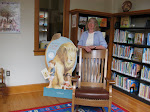The library’s book discussion group read “Reading Lolita in Tehran” this month. Personally, the book was a tough read. At times as I read about the oppression and fear these women were faced with on a daily basis, I felt like I was wading through a morass from which I’d never be free. Their resilience and spirit were amazing. I could write pages about what this book says to me as a woman, but what this book says to me as a reader is what I want to focus on here.
Azar Nafisi was and is a literature professor. Her discussions about literature from Jane Austin, to James Joyce, to Nabokov were often beyond me. Yet, as the book progressed what I kept wondering was why it was that novels and literature where so reviled by the Iranian regime, why it was literature professors that were questioned, intimidated and seen as revolutionary? Maybe scientists found themselves in similar situations and I just haven’t read about that. But I don’t think that’s the case. At least, that’s not the case Nafisi is trying to make. At its heart “Reading Lolita” is about the revolutionary, subversive world that fiction and novels open for us. Science, history, archeology all make us think, but it’s the ambiguity, the questioning, the opening ourselves to new and different ways of thinking and being that novels offer.
Religions, governments, parents even, have all come out against certain novels at one time or another. Reading fiction in general has been eschewed from time to time by different groups for reasons ranging from it’s "not real," it’s "not important," or it’s “just entertainment.” Nafisi’s book raises the question of whether what novels really do is open us up to questioning and thinking in ways that may threaten the status quo, the powers that be, or our own understandings and beliefs. From her perspective fiction, like many arts has the power to change the world. That makes it scary, and even subversive to some. So what have you read lately that rocked your world?
Subscribe to:
Post Comments (Atom)


No comments:
Post a Comment